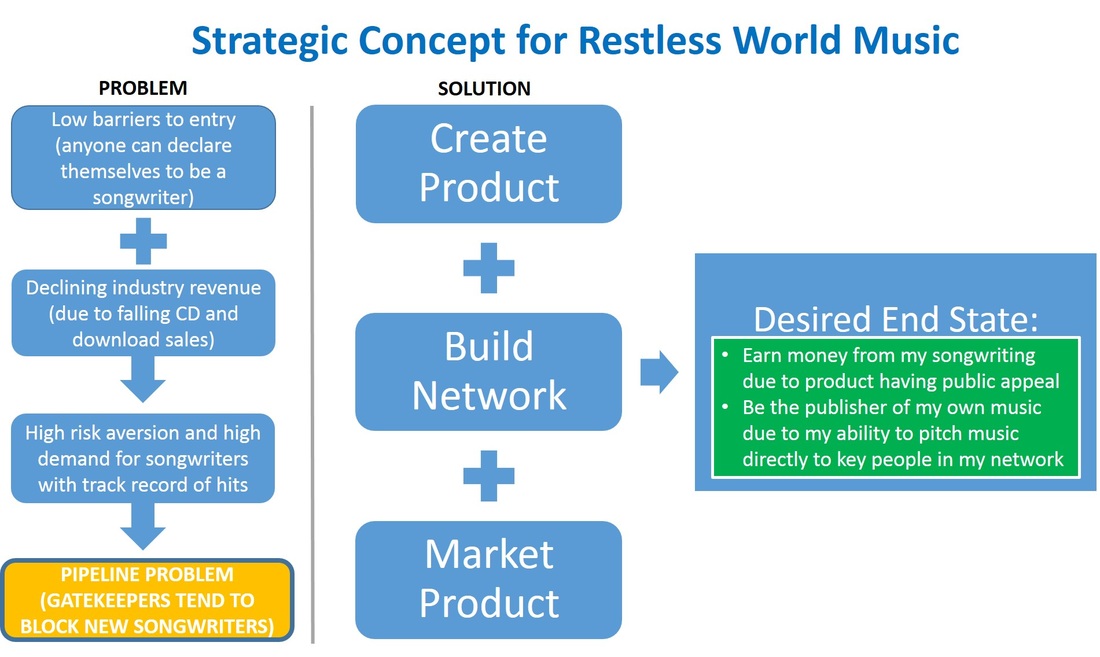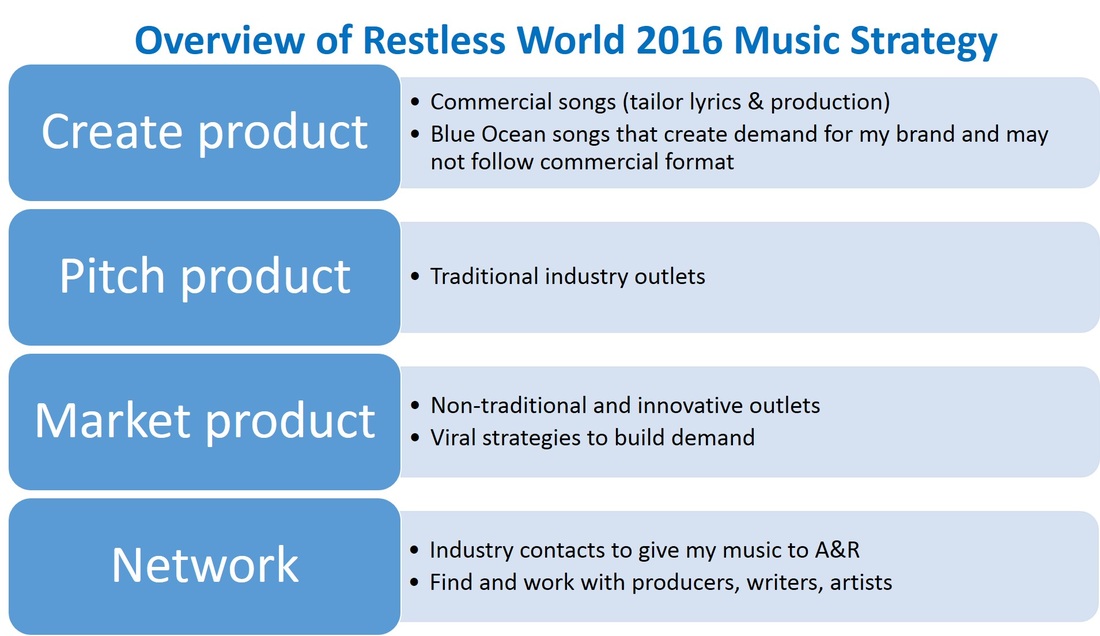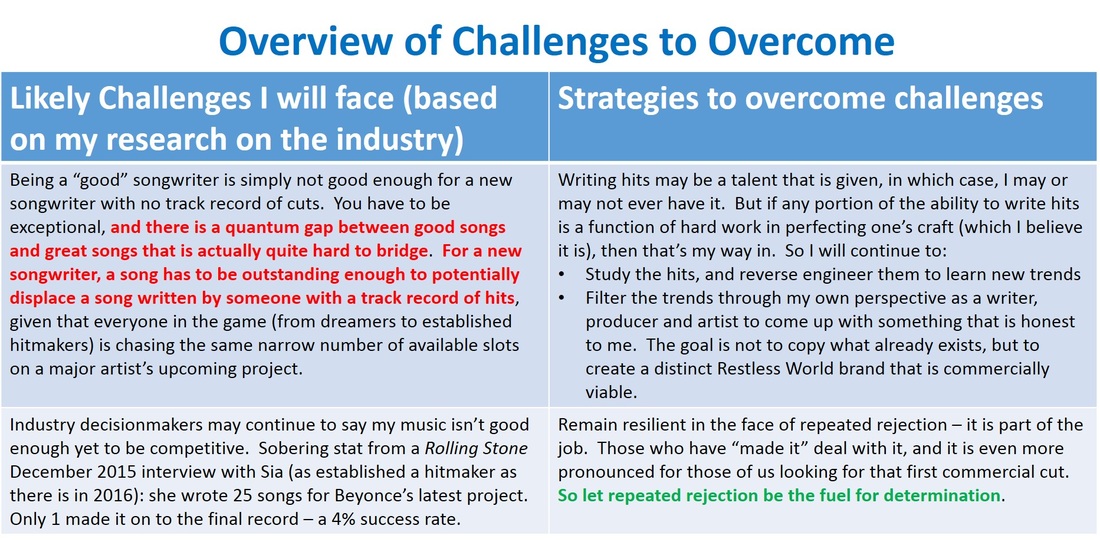|
Are Your Arrows Aligned? Do you think about your music strategically? I never used to - for me, music was about inspiration and self-expression. It still is, but as I began to focus on the dream of writing songs for a living, I realized the value of creating - and acting - with purpose. Imagine all the things you do in your musical life - composing, producing, recording, touring, promoting - as a set of arrows. Without purposeful action, these arrows may point in different directions and work against each other. With purposeful action, you can get these arrows pointed in the same direction, working together to propel you forward on your musical path. And the key to purposeful action? Having a plan. After spending several years in my day job helping people develop strategic plans, I learned that a good plan should answer three questions: Where am I now? Where am I trying to go? What do I need to understand and do to get there? Here are five steps I took to develop my plan, along with a free downloadable template you can use to develop yours. Five Steps to a Music Strategy First, define the problem. It could be arranging a 10-city tour. Or making contacts on Music Row in Nashville. For me, as an aspiring songwriter, it is how to get my songs noticed by music industry professionals. Defining the problem requires you to figure out what specific issue in your music life you want to tackle. And as part of this process, you can make sure that this issue is the right one to tackle at this point in your music life. For me, "getting my songs noticed" led me to think about whether or not my songs were good enough to merit any professional interest, and if not, what I could do to get them there. Once you define the problem, write it down. For those of us who write songs, we know that sometimes, it is only when we have words down on paper, or a track staring back at us from a screen, that we can figure out what is missing. Here is how I defined the problem that I would tackle in my music strategy. With better songwriters than me still struggling to get their songs heard, my chances of being heard are even lower. It's a pipeline problem: there is a ton of musical product out there of varying quality, but only a very narrow pipeline leading to industry professionals who have the leverage to monetize product globally through placement in major projects or licensing in major films and other media. Second, specify your approach to tackling the problem. One of the advantages of writing down your definition of the problem that you want to tackle is that it gets your brain working. You start drawing connections to industry trends you've read about, or to experiences you've had. All of this informs how you'll tackle the problem. One other important thing happens at this step: you can examine assumptions you are making about your musical path - especially since our assumptions of what we can and cannot do shape how we think about the problem we're tackling, how we tackle it, and whether our actions propel or short circuit our progress. For me, I realized that if it is a pipeline problem, there are only two ways to deal with it: get through the pipeline, or go around it. Both are huge challenges. Getting through the pipeline means having songs that are picked for projects over songs by better songwriters than me who are further along in their music careers and have track records of success. Do I really think I have songs right now at that level? Going around the pipeline is also a challenge. With social media platforms like YouTube filled with thousands of aspiring artists and producers, marketing to "the masses" directly now becomes the challenge of standing out from a huge online crowd. Here is what I came up with: Third, break your approach into buckets of tasks you intend to accomplish. Once you have defined the problem you intend to tackle and decided how you will tackle it - examining your assumptions along the way - the next step is to disaggregate it into buckets of smaller tasks. For example, if your problem is arranging a 10-city tour, figure out the smaller tasks you will need to tackle to accomplish the larger goal of arranging the tour. Three good things will happen here: Good thing #1: By thinking of smaller tasks, you'll start figuring out the best sequence or order in which tasks need to be completed. For example, before you reach out to clubs in different cities, you might want to figure out your criteria for picking cities to tour in - cost? friends with a sofa? ability to set up appointments with A&R while in town? anything else? - so that you maximize the return on your investment of time and resources spent touring. Good thing #2: You will also think of how the different buckets of tasks can relate to and reinforce each other, so that progress on one task propels progress on another. Remember the arrows? Think of each task bucket as an arrow, and about how these arrows can all point in the same direction: forward, toward the achievement of your goals. Good thing #3: As you think through the task buckets, you'll make connections to contacts and resources you can leverage to make progress on your goals. Some of these resources will be ideas from other spheres of life that you can apply to your music life. Remember, the music business is a business, which means it can be analyzed and navigated using concepts and strategies that work for businesses in general. Inspired by one of my day jobs, I read up on strategy execution and picked up insights that I have applied to strategizing about my music (the idea of "blue ocean songs" that you'll see below was my way of applying an insight from a book by two strategy and management professors called Blue Ocean Strategy: How to Create Uncontested Market Space and Make the Competition Irrelevant). Here are my task buckets: Fourth, identify when you intend to get these tasks done. Nothing propels a strategy forward better than a timeline. Timelines provide that sense of structure and accountability - critically important for those of us who pursue our musical life on the margins of day jobs and other responsibilities. Make your timeline ambitious (push yourself) but realistic (i.e. don't say "I'm going to have a #1 hit by tomorrow"). Since I do my strategic planning early in the calendar year for the entire year, I break my timeline into quarters so that every three months I can take stock of my progress. Here is a portion of my timeline: Fifth, identify the challenges you will face in completing these tasks, and decide how you will handle these challenges. You do not have to wait until you face a challenge to figure out what you can do to mitigate it. Spend some time anticipating where you might run into roadblocks (self-imposed, or imposed by others), and think about how you will cope. One advantage of doing this is you can think about what compromises you will make - and which ones you won't - on your musical path. Also, thinking in advance about anticipated challenges is a good way to make sure your expectations are realistic. Here are a few of the ones I identified for myself right now: What's the payoff? The immediate payoff is one that no one can take away from you: you are the CEO of your musical life, and having a strategy for that life written down can help you translate your musical dreams into something tangible - and manageable - that you can hold yourself accountable to pursuing. If six months pass and you have not done some of the items in your strategy, you have a basis for figuring out why (strategy too ambitious? unanticipated roadblocks? misplaced effort on your part? fear you did not realize you had?) and for revising your strategy to take into account and respond to this new information. The short, medium and long-term payoff is that purposeful action produces results. The results may not be as bold as what you wish for, or what you anticipated, and might occur much later than you hoped for, but results will happen. So align your arrows, and here's hoping you enjoy much success! Information on downloadable template I created my strategy document in an older version I purchased of Microsoft PowerPoint (MS PPT) 2007. The template is in .pptx format as it uses MS PPT's SmartArt graphics. If you do not have PPT 2007 or later PPT versions, Microsoft has an online version that you can use for free, provided you create a Microsoft account. Or you can use other software like Prezi, or just write it out by hand - what is important is the thinking you put into preparing your strategy. Good luck, and much success!
1 Comment
6/1/2016 09:42:18 pm
Excellent post! "Creatives" often fail to plan well and your strategic approach is much needed for songwriting success. Thank you! John
Reply
Your comment will be posted after it is approved.
Leave a Reply. |
Archives |
||||||





 RSS Feed
RSS Feed